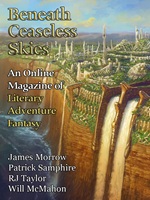 Beneath Ceaseless Skies #442, October 2, 2025
Beneath Ceaseless Skies #442, October 2, 2025
“The Last of Atlantis” by James Morrow
“The Thirteenth Time” by Patrick Samphire
“The Third Movement of Time” by RJ Taylor
“Pools of Light at the Centre of the World” by Will McMahon
Reviewed by Mina
This is the seventeenth anniversary double-issue. All four tales ask questions about what a life well lived may or may not signify.
In “The Last of Atlantis” by James Morrow, the narrator, Lucius, is living as a hermit on a small island, recounting his life of adventure. As a young man, he attempted to become a philosopher under Cicero’s teachings, passionate about the teachings of Plato, in particular that an unexamined life is not worth living. However, failing to make a living at such pursuits, he became a soldier, then joined the Roman navy, eventually earning his own ship.
Lucius deserted the navy along with his ship in the middle of a battle in an act of vengeance and treason. Eventually he found himself stranded in the ocean after a storm, awaiting death clinging to the prow of his destroyed vessel. Rescue came in the form of an airship. And so Lucius found himself on Atlantis.
Lucius learned that Atlantis built itself on the back of its slaves or “drudges.” He faced being turned into a drudge, a process not unlike a lobotomy. But instead, he was able to encounter the essence of concrete and abstract things in Plato’s heaven through pure logic. Confused? Read this story to find out how Lucius made it out alive despite the fall of Atlantis!
The author writes with gently black humour, clearly enjoying mixing tropes and genres. He also pokes fun at Greek philosophy, the Roman Empire, dubious ethics and the birth of Christianity. In the end, the narrator concludes, what matters is not an unattainable ideal but a life well lived, with gratitude for the real beauty in the present moment. An amusing romp through existential questions.
“The Thirteenth Time” by Patrick Samphire begins on a grim note with the stoning to death of a god. The narrator and his two friends, Adrin and Twelve-times, used to go to a magical glade outside the city. Twelve-times is dying and wants to find the glade again. A glade where a godling offered them a choice with the promise of a great future. None of them had the courage to make that choice. They return to the glade and are again presented with new possibilities.
The tale follows its nasty beginning to its twisted end. It’s a comment on aging, friendship, killing the sacred, common-place human cowardice and a humdrum existence that we still cling to with our fingernails. I’m not sure I cared much by the end. It was like the opposite of an uplifting story.
“The Third Movement of Time” by RJ Taylor was a real treat. I loved this pastiche of Holmes and Watson, replaced by two women, with some magic thrown in. What starts out as the investigation of a disappearance of a famous artist by his academic sister turns into a philosophical discourse about how best to live life. What does a successful life actually mean? A deceptively simple tale with quiet depths. The science was just as interesting as the magic and the musical metaphor. Do read this one.
I particularly liked the line: “I should like to live in a world where people’s desires, and humble requests, are honoured.”
“Pools of Light at the Centre of the World” by Will McMahon is also available as a podcast. I listened to it which turned out to be a good idea because this story has a strong rhythm. With each repeating cycle, we learn something new, as a castaway wanders round a foreign land. The castaway’s name is quite a mouthful: Ziyād ibn `Umar ibn Qāsim al-Ḥarīrī al-Bajjānī. It felt like the author was imitating and gently making fun of a story form I am unfamiliar with.